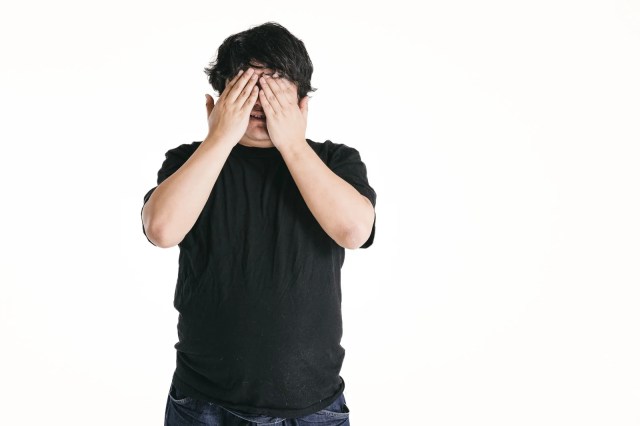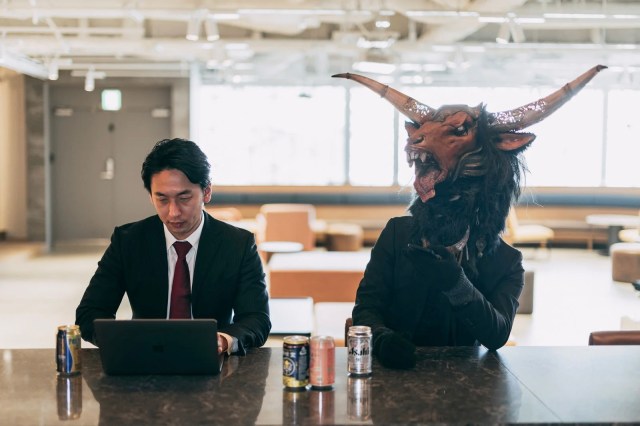
I’m going to lend the video to someone within a week anyway… just in case.
Japan is home to all kinds of festivals from snow festivals and lantern festivals to fight festivals and naked festivals. But none of them are quite like the Sleeping Festival (Nematsuri) in Taharashi City, Aichi Prefecture… At least, I assume that’s the case because hardly anyone has ever seen it to know for sure.
The oldest record of this Sleeping Festival is from 1707 but even back then it was stated that the origin of the festival is unknown, making it potentially much older. The rituals involved have changed somewhat over the centuries but essentially consist of Shinto priests and/or others carrying something between Kobe Omiyashinmeisha Shrine and Hisamaru Shrine on certain days that correspond to the Lunar New Year. In its current form, a procession of about 10 people carries a sacred object in a box from Hisamaru to Omiyashinmeisha and then back again.
▼ The shrines are only about 550 meters (0.3 miles) apart but the procession takes about half an hour to make a one-way journey.
There are also rituals held when the object leaves Hisamaru, arrives at Omiyashinmeisha, leaves Omiyashinmeisha the next day, and returns to Hisamaru, as well as a final ritual to confirm the successful movement of the object. However, none of this should be seen by anyone and that is one detail of the Sleeping Festival that has hardly changed for centuries.
In fact, the reason it’s called the Sleeping Festival is that when it’s happening, everyone stays home and keeps their doors and windows shut, so it appears as if everyone is sleeping. The shrines even put up signs during the time of the festival to warn everyone not to come near the premises or even look in its general direction. This is because it is said anyone who sets their eyes on this festival will meet with serious misfortune.
▼ “Hi! Name’s misfortune. Seriously nice to meet ya!”
A few decades ago an elementary school principal went to visit his friend who was a priest during the Sleeping Festival and suffered a stroke which required a year to recover from. In 1929, a man building a smokestack for a factory looked down and saw the Slumber Festival, mocking it and the gods for not striking him down then and there. The next day he fell to his death. In the 1930s, a Korean person who was unfamiliar with the festival saw it while hanging some laundry out to dry. They then developed a fever which they recovered from only after an exorcism was performed.
It was also said that during the Meiji Restoration, when traditional Japanese customs were falling out of favor to more modern Western trends, the viewing restriction was lifted. However, after someone who saw the festival died, they strictly enforced it once again.
Granted, these anecdotes all have a very urban-legend vibe to them, but people still take it quite seriously. Teachers tell kids not to go out when its happening and most of the locals have never seen the Sleeping Festival for their entire lives. Accidents do happen from time to time, however, so a special forgiveness ceremony is held afterward for those who happened to have caught a glimpse of it to reset their luck.
Now that everyone’s up to speed on the Sleeping Festival and the dangers that simply setting your eyes on it might hold, let’s all take a look at it! For the first time ever, the shrines have allowed a TV crew to film the festival.
▼ The festival itself can be seen about two minutes into the segment.
According to the organizers, only looking at the real thing in person is bad luck, and watching a video doesn’t hold the same accursed potential. The reason that they wanted their forbidden-to-view festival to finally be viewed is that its future is in jeopardy. Turns out, when you forbid everyone from seeing your festival and no one knows what goes on in it, it’s really hard to find new people to carry it on. This begs the question, why even bother carrying on a festival that brings bad luck to people?
Although the exact origins of the festival itself are unclear, it is known to be based on the story of Prince Hisamura who was forced to flee a major civil war during the 14th century. He ended up in this area and was taken in by the local nobility and townsfolk. He spent the rest of his days dressed as a woman to avoid capture, and his skin was afflicted with a purple rash by whatever he used to make it look whiter.
His appearance was so sad that when he took his daily walks around Omiyashinmeisha the townsfolk averted their eyes out of pity. It could also be said that looking at him was bad luck in that whoever did might be accused of harboring a fugitive and face the penalty should the prince ever be discovered.
▼ The story of Prince Hisamaru and the Sleeping Festival, which unfortunately is only in Japanese.
So, in that way, the Sleeping Festival serves as a reminder of the community’s ability to band together and help someone out in need. And while its future might be in danger now, they’ve somehow managed to keep it going this way for longer than anyone knows, so perhaps they can find a way.
I’d personally recommend they get some of those avatar robots that work at Family Mart to carry the sacred objects and let people help via VR or remote control. That way the tradition can continue and no one has to look directly at it ever again!
Sources: TBS News Dig, Kobe City Minkan
Featured image: Pakutaso
Insert image: Pakutaso
● Want to hear about SoraNews24’s latest articles as soon as they’re published? Follow us on Facebook and Twitter!


 Here are five incredible places to add to your itinerary on a visit to Shimane’s Izumo City
Here are five incredible places to add to your itinerary on a visit to Shimane’s Izumo City Japanese man rides 1,000 kilometres on stolen mamachari bicycle to see Tokyo for first time
Japanese man rides 1,000 kilometres on stolen mamachari bicycle to see Tokyo for first time Mystery “nail house” discovered in Japan
Mystery “nail house” discovered in Japan 64-year-old man arrested for stealing a roll of toilet paper from hospital toilet
64-year-old man arrested for stealing a roll of toilet paper from hospital toilet Shizuoka hot springs town invites you to see one of the longest hina doll displays in Japan
Shizuoka hot springs town invites you to see one of the longest hina doll displays in Japan Ghibli’s Kiki’s Delivery Service returns to theaters with first-ever IMAX screenings and remaster
Ghibli’s Kiki’s Delivery Service returns to theaters with first-ever IMAX screenings and remaster Japan has only one airport named after a samurai, so let’s check out Kochi Ryoma【Photos】
Japan has only one airport named after a samurai, so let’s check out Kochi Ryoma【Photos】 Starbucks Japan adds new sakura Frappuccino and cherry blossom drinks to the menu
Starbucks Japan adds new sakura Frappuccino and cherry blossom drinks to the menu Is Oni Koroshi sake in a drink box wino fuel or a hidden gem?
Is Oni Koroshi sake in a drink box wino fuel or a hidden gem? Family Mart’s Shibuya Cat Street shop hosts first-ever rescue cat photo exhibition for Cat Day
Family Mart’s Shibuya Cat Street shop hosts first-ever rescue cat photo exhibition for Cat Day A fun and cheap souvenir for kids: 100-yen shop play money featuring Japan’s brand-new yen bills!
A fun and cheap souvenir for kids: 100-yen shop play money featuring Japan’s brand-new yen bills! The 10 best manga to read in 2022, as recommended by Japanese bookstores
The 10 best manga to read in 2022, as recommended by Japanese bookstores Cats and dogs apologising at Japanese press conference is our newest gacha capsule toy obsession
Cats and dogs apologising at Japanese press conference is our newest gacha capsule toy obsession This overlooked neighborhood east of Tokyo is awesome in many ways, left us with just one regret
This overlooked neighborhood east of Tokyo is awesome in many ways, left us with just one regret Japan’s newest weird capsule toys are…super realistic capsule rocks?!?【Photos】
Japan’s newest weird capsule toys are…super realistic capsule rocks?!?【Photos】 The 10 most annoying things foreign tourists do on Japanese trains, according to locals
The 10 most annoying things foreign tourists do on Japanese trains, according to locals Starbucks Japan releases new sakura goods and drinkware for cherry blossom season 2026
Starbucks Japan releases new sakura goods and drinkware for cherry blossom season 2026 Is Sapporio’s Snow Festival awesome enough to be worth visiting even if you hate the snow? [Pics]
Is Sapporio’s Snow Festival awesome enough to be worth visiting even if you hate the snow? [Pics] Japan has trams that say “sorry” while they ride around town…but why?
Japan has trams that say “sorry” while they ride around town…but why? Tokyo Skytree turns pink for the cherry blossom season
Tokyo Skytree turns pink for the cherry blossom season Highest Starbucks in Japan set to open this spring in the Tokyo sky
Highest Starbucks in Japan set to open this spring in the Tokyo sky Japan’s new “Cunte” contact lenses aren’t pronounced like you’re probably thinking they are
Japan’s new “Cunte” contact lenses aren’t pronounced like you’re probably thinking they are Shibuya Station’s Hachiko Gate and Yamanote Line stairway locations change next month
Shibuya Station’s Hachiko Gate and Yamanote Line stairway locations change next month Yakuzen ramen restaurant in Tokyo is very different to a yakuza ramen restaurant
Yakuzen ramen restaurant in Tokyo is very different to a yakuza ramen restaurant Japan’s newest Shinkansen has no seats…or passengers [Video]
Japan’s newest Shinkansen has no seats…or passengers [Video] Foreigners accounting for over 80 percent of off-course skiers needing rescue in Japan’s Hokkaido
Foreigners accounting for over 80 percent of off-course skiers needing rescue in Japan’s Hokkaido Super-salty pizza sends six kids to the hospital in Japan, linguistics blamed
Super-salty pizza sends six kids to the hospital in Japan, linguistics blamed Starbucks Japan unveils new sakura Frappuccino for cherry blossom season 2026
Starbucks Japan unveils new sakura Frappuccino for cherry blossom season 2026 Foreign tourists in Japan will get free Shinkansen tickets to promote regional tourism
Foreign tourists in Japan will get free Shinkansen tickets to promote regional tourism Take a trip to Japan’s Dododo Land, the most irritating place on Earth
Take a trip to Japan’s Dododo Land, the most irritating place on Earth Naruto and Converse team up for new line of shinobi sneakers[Photos]
Naruto and Converse team up for new line of shinobi sneakers[Photos] Is China’s don’t-go-to-Japan warning affecting the lines at a popular Tokyo gyukatsu restaurant?
Is China’s don’t-go-to-Japan warning affecting the lines at a popular Tokyo gyukatsu restaurant? Survey asks foreign tourists what bothered them in Japan, more than half gave same answer
Survey asks foreign tourists what bothered them in Japan, more than half gave same answer Japan’s human washing machines will go on sale to general public, demos to be held in Tokyo
Japan’s human washing machines will go on sale to general public, demos to be held in Tokyo Starbucks Japan releases new drinkware and goods for Valentine’s Day
Starbucks Japan releases new drinkware and goods for Valentine’s Day We deeply regret going into this tunnel on our walk in the mountains of Japan
We deeply regret going into this tunnel on our walk in the mountains of Japan Studio Ghibli releases Kodama forest spirits from Princess Mononoke to light up your home
Studio Ghibli releases Kodama forest spirits from Princess Mononoke to light up your home Major Japanese hotel chain says reservations via overseas booking sites may not be valid
Major Japanese hotel chain says reservations via overseas booking sites may not be valid Put sesame oil in your coffee? Japanese maker says it’s the best way to start your day【Taste test】
Put sesame oil in your coffee? Japanese maker says it’s the best way to start your day【Taste test】 No more using real katana for tourism activities, Japan’s National Police Agency says
No more using real katana for tourism activities, Japan’s National Police Agency says Here are all of the reasons why you should go to Kumano, Mie Prefecture, for summer sightseeing
Here are all of the reasons why you should go to Kumano, Mie Prefecture, for summer sightseeing Niigata brings back mysterious cat mask festival for the first time in almost 90 years
Niigata brings back mysterious cat mask festival for the first time in almost 90 years Sneak Peek Into Japanese All-Boys High Schools: 50 Surprising and Unsurprising Things You’d See
Sneak Peek Into Japanese All-Boys High Schools: 50 Surprising and Unsurprising Things You’d See